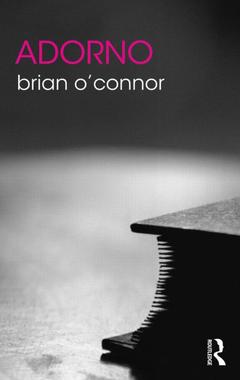Adorno The Routledge Philosophers Series
Auteur : O'Connor Brian

Theodor W. Adorno (1903-69) was one of the foremost philosophers and social theorists of the post-war period. Crucial to the development of Critical Theory, his highly original and distinctive but often difficult writings not only advance questions of fundamental philosophical significance, but provide deep-reaching analyses of literature, art, music sociology and political theory.
In this comprehensive introduction, Brian O?Connor explains Adorno?s philosophy for those coming to his work for the first time, through original new lines of interpretation. Beginning with an overview of Adorno?s life and key philosophical views and influences, which contextualizes the intellectual environment in which he worked, O?Connor assesses the central elements of Adorno?s philosophy.
He carefully examines Adorno?s distinctive style of analysis and shows how much of his work is a critical response to the various forms of identity thinking that have underpinned the destructive forces of modernity. He goes on to discuss the main areas of Adorno?s philosophy: social theory, the philosophy of experience, metaphysics, morality and aesthetics; setting out detailed accounts of Adorno?s notions of the dialectic of Enlightenment, reification, totality, mediation, identity, nonidentity, experience, negative dialectics, immanence, freedom, autonomy, imitation and autonomy in art. The final chapter considers Adorno?s philosophical legacy and importance today.
Including a chronology, glossary, chapter summaries, and suggestions for further reading, Adorno is an ideal introduction to this demanding but important thinker, and essential reading for students of philosophy, literature, sociology and cultural studies.
Chronology 1. Adorno’s Life and Philosophical Motivations 2. Society 3. Experience 4. Metaphysics 5. Freedom and Morality 6. Aesthetics 7. Philosophical Legacy. Glossary Bibliography. Index
Brian O’Connor is Associate Professor of Philosophy at University College Dublin, Ireland. He is the author of Adorno’s Negative Dialectic (2004) and editor of The Adorno Reader (2000).
Date de parution : 09-2012
13.8x21.6 cm
Date de parution : 09-2012
13.8x21.6 cm
Thème d’Adorno :
Mots-clés :
social; totality; adornos; philosophy; notion; mimetic; comportment; negative; dialectics; conception; Holds; Contemporary Society; Adorno’s Philosophy; Adorno’s Critical Theory; West Germany; Determinate Negation; Adorno’s Conception; Adorno’s Aesthetic Theory; Social Totality; Mimetic Comportment; Adorno’s Notion; Subject Object Mediation; Subject Object Interaction; Better Life; Follow; Adorno’s Position; Negative Dialectics; Adorno’s Theory; Post-war; Baudelaire; Aesthetic Mimesis; Cir; Adorno’s Thesis; Identity Thinking; Adorno’s Critique



